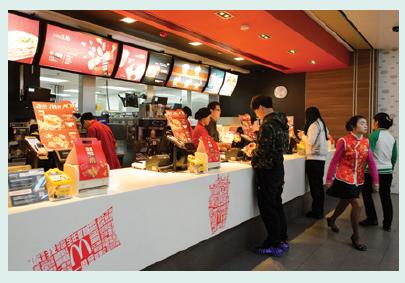It would be no surprise to most management students that as of May 2015, McDonalds was the
Question:
It would be no surprise to most management students that as of May 2015, McDonald’s was the sixth most valuable brand according to Forbes magazine. In terms of global restaurant brands it was the clear leader, with Starbucks being the next entry on the list at number 52. The golden arches of the fast‐food restaurant chain are instantly recognisable to people of all ages around the world. What is surprising, however, is that this franchising giant is suffering flagging sales in the United States. In the second quarter of 2015, US sales slid by 2 per cent and the company’s net profits fell 13 per cent. What is going wrong with this iconic brand and does it matter?
From 2002 onwards, McDonald’s in the US underwent a period of store remodelling and upgrading in an attempt to lure customers to return. Up until 2015, however, the sales problem persisted. The restaurant chain is now experimenting with greater food variety, greater customer choices and healthier food options. This strategy, however, is somewhat contrary to the company’s traditional image as offering convenient, fast and cheap food. Some commentators have described McDonald’s as undergoing an identity crisis, as customers are opting for higher priced and healthier food options in restaurants such as Grill’d burgers in Australia and Chipotle Mexican Grill in the United States.
McDonald’s identity crisis, however, may be accelerating as it finds its sales and store openings soaring in China. In 2013, McDonald’s opened 275 new stores in China with an aim of opening 300 in 2014. This contrasts with their activity in the United States, where there were 225 new restaurants in 2013 and 250 in 2014. The impressive expansion in China aims to tap into the expanding middle class there; the number of people earning between $17 000 to $35 000 in China is estimated to grow from 6 per cent in 2010 to 50 per cent by 2020. However, to succeed in China, McDonald’s must change.
McDonald’s must change in China because its growth has been weak compared to KFC’s spectacular growth from 1987 to 2012.16 KFC succeeded, to some extent, by de‐Westernising its stores and menu, offering, for example, Peking Duck burritos and creating a clean, upscale dining environment. McDonald’s is trying to follow suit. There is indeed a limit as to how much Western culture a Chinese customer wants or expects in dining out, and so the architecture of a new McDonald’s restaurant China often follows regional as well as more typical national trends. Some tables in the restaurant are round and seat up to ten people, which is more in line with the expectations of groups that are going out to dine in China. Menu offerings are more locally oriented, with pork and chicken, rather than beef, being included in more items.
Although global expansion and cultural adaptation is a strategy that is working for McDonald’s, the fall of KFC in China from 2012 to 2015 is instructive. Major food scandals and intense local competition had a huge impact on KFC’s sales in China, and the parent company Yum! Brands decided to spin off its Chinese unit as a separate publically listed company to decouple itself from China’s roller coaster consumer ride. KFC suffered, in particular, after consumers became aware of reports outlining the use of expired meat.17 Strategists at McDonald’s will hopefully realise that there is no substitute for product quality and food safety and that it must continually innovate to survive against the inevitable onslaught of persistent, quality local competition.
QUESTION
What growth strategy would you recommend for McDonald’s in China? How can McDonald’s overcome the current challenges that it faces in the United States?
Step by Step Answer:

Management
ISBN: 9780730329534
6th Asia Pacific Edition
Authors: Schermerhorn, John, Davidson, Paul, Factor, Aharon, Woods, Peter, Simon, Alan, McBarron, Ellen





